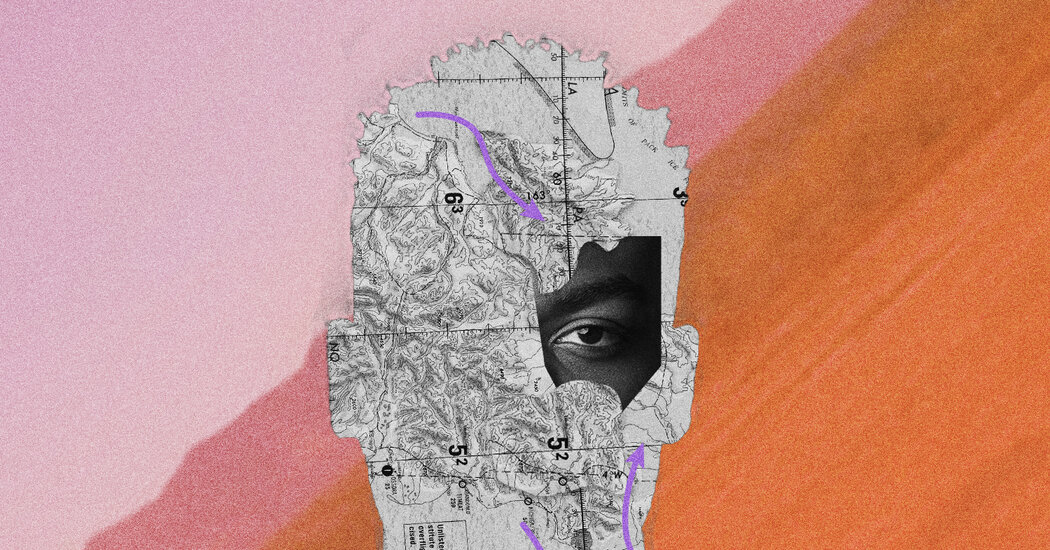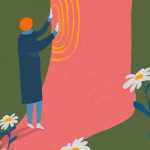Unfortunately, my inner life didn’t match my parents’ steeliness. I was a moody kid, prone to melancholic jags. My mom loves to clown me about how, at 6 years old, I would put on an old Don McLean LP of hers — the “American Pie” album — and set the needle down on “Vincent,” McLean’s mournful paean to Vincent van Gogh’s volatility. Sitting in a chair next to the record player, I’d play the song over and over and over, listening tearfully. When my favorite TV characters died, I’d mourn them, staying in my feelings for days at a time. When I became a teenager, I spent flat, sunny L.A. days listening to Radiohead, trying to conjure a vibe that felt closer to my baseline emotional state. Culture became a prosthesis, a way to manage and explore my psychology. If I had no idea how to develop an intimate relationship with myself, art was an acceptable way to understand feeling.
By the time I was an adult, this dissonance between how I was and how I wanted tobe — or how I thought I should be — weighed on me. Things came to a head in 2015. Mentally and emotionally exhausted after passing my qualifying exams during graduate studies at Cal Berkeley, I returned all my books to the campus library and lay down in bed for a week. I ate Trader Joe’s cookies and binged “Arrested Development” before decamping back home to Los Angeles, where I crawled into bed and ate Ben & Jerry’s while rewatching “Mad Men” for a few weeks more. What at first felt like luxuriating in success started to feel like misery, a desperation I was confused and embarrassed by. Something about the process of studying for the exams had lowered a screen between myself and the world. The obsessive, analytic frame that had been a boon in one part of my life became a burden in every other regard. It was like having a vindictive second head on my shoulder, a bummer party guest whispering clever skepticism into my ear. The anxiety over failure that characterized my year of preparation thickened instead of dissipating.
I returned to Berkeley in the fall, my tongue between my teeth, worried about what admitting my difficulties might mean for academic progress. It turned out that a few of my friends — white women, mostly — had been having similar struggles and begun making use of university-approved therapists. When they told me about how they confided in these strangers, I politely listened, and even contemplated seeking out my own therapist. But I couldn’t quite shake my old reservations. I spent my days sitting in classrooms, reading in the California sun, taking notes in cafes. What did somebody like me need therapy for?
As the fall wore on, though, ballooning distress compelled me to try. When I finally sat down with a handful of therapists, I was put off by what they asked me to explore: my childhood, my parents, my feelings — oh, God. Though I probably intuited that I needed a guide to help me explore my interior life, what I wanted was someone to help me troubleshoot what I interpreted as a malfunctioning brain, not plumb emotional depths that had been heretofore blocked. Eventually I met a therapist who practiced cognitive behavioral therapy, an approach whose orientation toward problem-solving suited me. C.B.T. gave me language and strategies that were comfortable, a tool kit for conquering the knotty thicket of my emotions.
A few months into working with this therapist, I went back home and nervously told my family about my decision and what had precipitated it. I’d learned to register, name and acknowledge my feelings as a way of managing them rather than being overwhelmed. Immediately I recognized the sheer fear I felt in trying to communicate all this to my brother and parents. The crestfallen look on my mother’s face made me regret, briefly, telling them at all. Had she done something wrong as a parent? she asked me. As if I were undergoing treatment for an illness, she wondered how long I’d see my therapist. Sadness sneaked up on me as I tried to describe my emotional life to people who I knew loved me but with whom I communicated through a haze of mutual discomfort.




